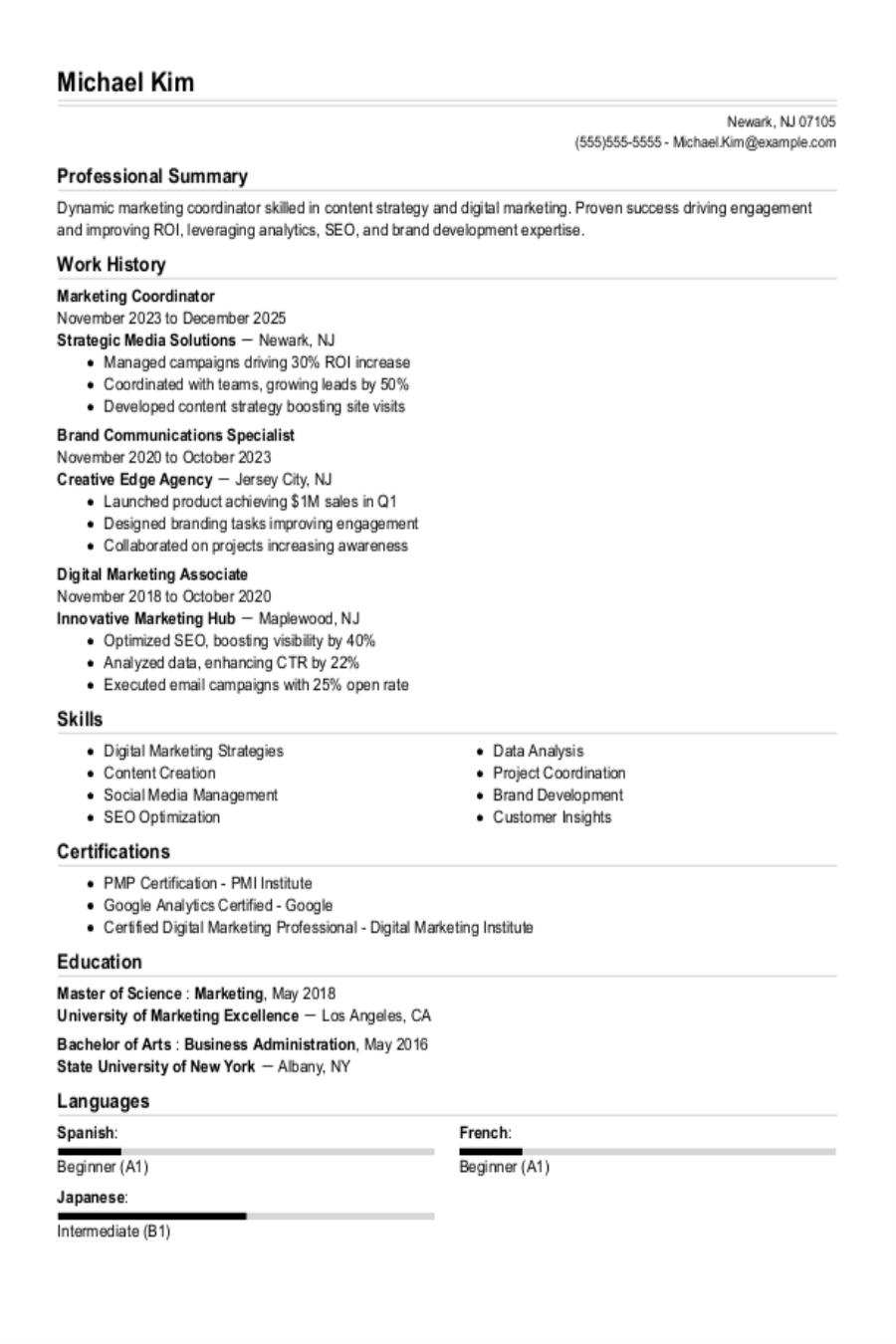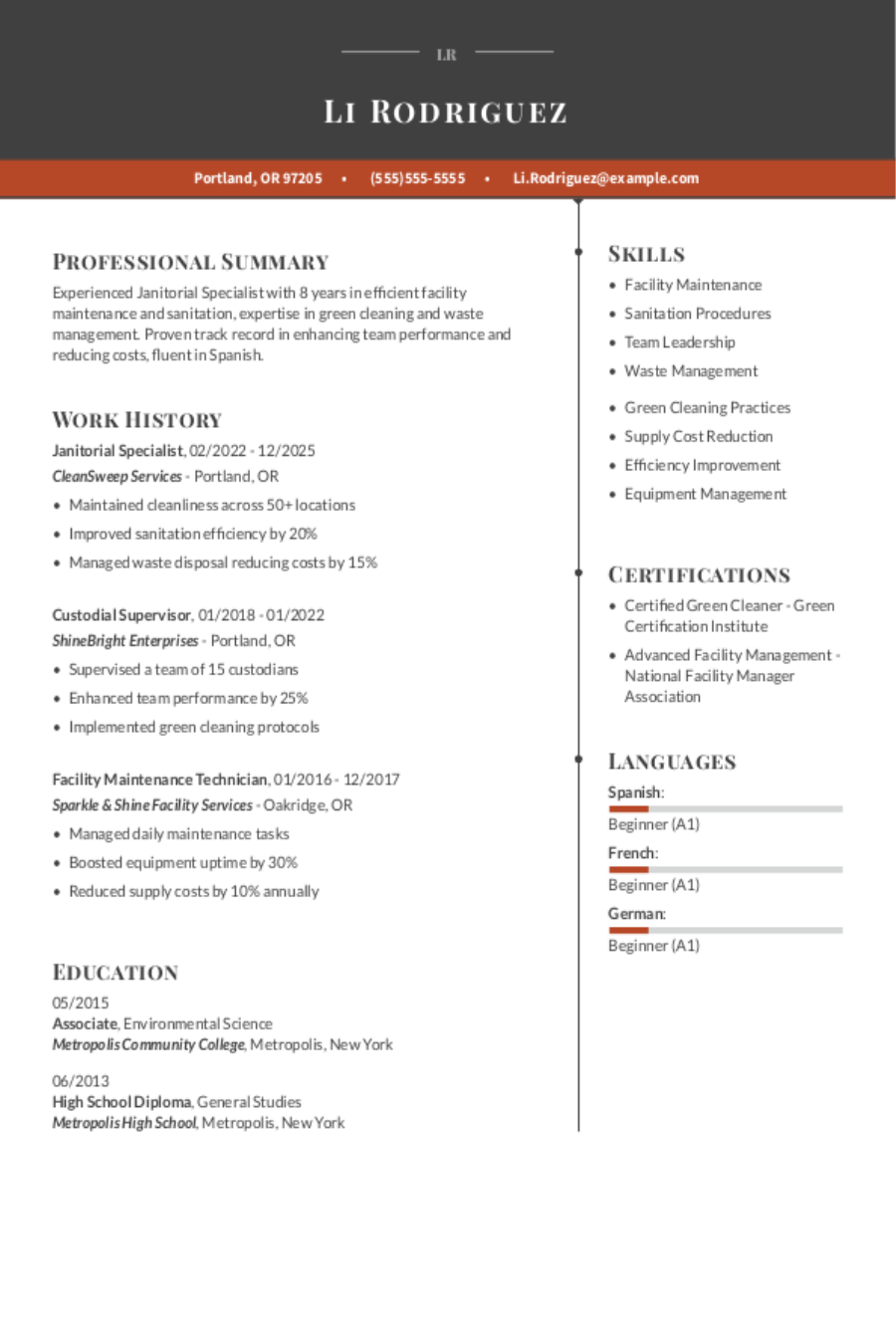Table of contents
Popular Supply Chain Manager Resume Examples
Entry-level supply chain manager resume
An entry-level resume for a supply chain manager should focus on relevant coursework, internships, practical skills in logistics and inventory management, and any certifications to demonstrate capability.
Places skills over experience: Using a functional resume format is strategic for this entry-level supply chain manager as it highlights critical skills like logistics optimization and contract negotiation, rather than focusing on limited work history.
Focuses on goals: This job seeker demonstrates a strong foundation in supply chain management, showcasing significant achievements in cost reduction and process efficiency while pursuing professional growth through advanced education and certifications.
Mid-career supply chain manager resume
A mid-career supply chain manager resume should effectively highlight a combination of industry experience, strategic skills, and achievements in process improvement to demonstrate professional growth and readiness for advancement.
Employs active language: Incorporating action verbs such as "reduced," "streamlined," and "led" highlights significant accomplishments, showcasing initiative and measurable outcomes in supply chain management.
Balances skills and experience: This job seeker's resume showcases a mix of technical expertise in supply chain management and a clear trajectory of advancement, effectively illustrating their accomplishments and professional growth within the industry.
Experienced supply chain manager resume
An experienced supply chain manager resume should emphasize quantifiable achievements and demonstrate a clear career path to effectively highlight professional growth and expertise in the industry.
Quantifies achievements: Quantifiable achievements in a supply chain manager's resume provide clear evidence of their impact on operational success. By showcasing specific metrics, such as cost reductions and efficiency improvements, applicants make their contributions more tangible and memorable to recruiters.
Optimized for ATS: The resume uses a professional header and an ATS-friendly resume layout, improving readability for both recruiters and automated systems, ensuring critical information is easily accessible.
No experience supply chain manager resume
A resume for an applicant with no experience should highlight transferable skills, relevant coursework, and any internships or volunteer work that showcase problem-solving abilities and teamwork in logistics.
Overcomes lacking experience: Including extracurricular activities and volunteer experiences can improve a resume by demonstrating valuable skills and commitment, significantly bolstering the job seeker's appeal despite limited professional experience.
Avoids jargon: Job seekers often feel the need to embellish their experience with complex terms and phrases. However, this resume demonstrates how using straightforward language to describe their roles can be much more effective.
More resume examples
Supply Chain Manager Resume Template
Kickstart your career with this supply chain manager resume template. Personalize it easily by adding your unique experiences and skills to stand out in the job market.
Donna Bryant
Parkview, MO 65702
(555)555-5555
Donna.Bryant@example.com
Professional Summary
Results-driven Supply Chain Manager adept in strategic operations and cost reduction, boosting delivery efficiencies with impactful leadership.
Work History
Supply Chain Manager
Global Logistics Solutions - Parkview, MO
June 2022 - October 2025
- Reduced costs by 15% with strategic planning
- Improved delivery times by 30%
- Implemented eco-friendly packaging solutions
Operations Coordinator
Pacific Freight Corp. - St. Charles, MO
April 2019 - June 2022
- Increased operational efficiency by 25%
- Boosted team productivity by 20%
- Managed inventory audits accurately
Logistics Analyst
Sunset Transport Inc. - Chesterfield, MO
January 2018 - April 2019
- Enhanced data accuracy by 40%
- Developed cost-effective route plans
- Streamlined shipment processes
Education
Master of Business Administration Supply Chain Management
University of California, Berkeley Berkeley, CA
June 2017
Bachelor of Science Transport and Logistics
University of Illinois Urbana, IL
June 2015
Skills
- Strategic Planning
- Inventory Management
- Process Optimization
- Data Analysis
- Transportation Management
- Cost Reduction Strategies
- Supplier Negotiation
- ERP Systems
Certifications
- Certified Supply Chain Professional - Association for Supply Chain Management
- Logistics and Transportation Certification - American Society of Transportation and Logistics
Languages
- Spanish - Beginner (A1)
- French - Intermediate (B1)
- Mandarin - Beginner (A1)
Must-Have Skills on a Supply Chain Manager Resume
A well-written skills section can significantly boost the effectiveness of your resume.
Leadership and management professionals guide teams, shape strategy, and drive results. The skills you highlight should reflect your ability to align people and priorities and move goals forward. The aim of your resume is to show how your leadership skills contribute to long-term growth and organizational success.
The following data highlights essential hard and soft skills for a supply chain manager resume based on Resume Now’s comprehensive analysis.
When you’re ready to improve your resume, try our AI Resume Skills Generator. It offers tailored suggestions of both hard and soft skills according to your job title, ensuring a robust and personalized skill set.
Writing Your Supply Chain Manager Resume
Having explored these compelling resume examples, you are now prepared to dive into the process of learning how to write a resume. We will guide you step by step through each section, ensuring you create a standout document.
List your most relevant skills
An effective skills section on your supply chain manager resume should focus on highlighting both technical skills, such as inventory management and logistics planning, and essential soft skills like negotiation and analytical thinking.
To make your skills stand out, carefully analyze job listings for keywords from the job listing that align with your experience. Integrating these keywords not only helps human recruiters see that you are a good match but also improves your chances of passing through applicant tracking systems. Tailoring this section will show employers you understand their needs and are prepared to contribute effectively to their team.
Example of skills on a supply chain manager resume
- Proficient in logistics management and inventory control to optimize supply chain efficiency
- Skilled in negotiating with suppliers to secure favorable terms and pricing
- Strong communicator with a collaborative approach to team projects
- Analytical thinker with a focus on data-driven decision making
Highlighting your soft skills on your resume can set you apart from other job seekers. Employers value interpersonal abilities because they are challenging to develop, and showcasing them demonstrates your potential to contribute positively to team dynamics.
Highlight your work history
Your work experience section should focus on your achievements and demonstrate how you effectively applied your skills in logistics, procurement, and inventory management. Use this space to highlight specific accomplishments that illustrate your impact on operational efficiency and cost savings.
When detailing each job entry, be sure to include essential information: your job title, the name of the employer, and the dates of employment. This information is critical as it establishes your professional credibility and provides context for your experiences.
Example of a supply chain manager work experience entry
- Supply Chain Manager
ABC Logistics - Dallas, TX
June 2019 - Present - Oversee the end-to-end supply chain processes for a portfolio of clients, ensuring timely delivery and optimizing logistics costs by 15%
- Develop and implement inventory management strategies that reduced stockouts by 30% while improving order fulfillment rates to 98%
- Lead cross-functional teams in the planning and execution of supply chain initiatives, improving collaboration and achieving project milestones ahead of deadlines
- Analyze market trends and supplier performance metrics to negotiate contracts that resulted in a 20% reduction in procurement costs
- Mentor junior staff on best practices in supply chain operations, fostering an environment of continuous improvement and professional development
Quantifying achievements as a supply chain manager is vital for showcasing your impact on operational efficiency. For example, stating that you reduced logistics costs by 15% over a year provides concrete evidence of your ability to drive cost-saving initiatives and optimize processes.
Include your education
The education section of your supply chain manager resume should list academic qualifications in reverse-chronological order, starting with the most recent degree. Include relevant diplomas and degrees, but you may exclude your high school diploma if you have a bachelor's degree or higher.
If you are currently pursuing a degree or your education is incomplete, indicate the highest completed level along with an expected graduation date. You should also consider including bullet points that outline relevant coursework or notable academic achievements. This practice is particularly useful for those who are students or recent graduates.
Common certifications for a supply chain manager resume
- Certified Supply Chain Professional (CSCP) – Association for Supply Chain Management (ASCM)
- Certified in Planning and Inventory Management (CPIM) – Association for Supply Chain Management (ASCM)
- Lean Six Sigma Green Belt – American Society for Quality (ASQ)
- Project Management Professional (PMP) – Project Management Institute (PMI)
Sum up your resume with an introduction
Creating a strong profile section on your resume is important for making a powerful first impression. This section serves as a snapshot of your qualifications and sets the tone for the rest of your application, allowing potential employers to quickly gauge your fit for the role.
For experienced applicants, a professional summary is particularly effective. It allows you to succinctly showcase your most significant accomplishments and expertise right at the top of your resume. If you’re just starting out, write a resume objective that highlights your commitment to building your career.
Professional summary example
Results-driven supply chain manager with over 8 years of experience in optimizing logistics and inventory management within dynamic industries. Demonstrated success in reducing costs through efficient procurement strategies, improving supplier relationships, and implementing data-driven decision-making processes. Highly adept at analyzing market trends and streamlining operations to boost overall productivity.
Resume objective example
Enthusiastic supply chain manager eager to use strong analytical and problem-solving skills within a forward-thinking organization. Committed to optimizing processes and improving inventory management strategies to drive efficiency and support overall business objectives.
As a supply chain manager, your resume profile is important for making a strong first impression. It’s your chance to weave in essential keywords from job descriptions that highlight your qualifications. By doing this, you improve your chances of getting past ATS filters and landing interviews with potential employers.
Add unique sections to set you apart
Including optional resume sections can significantly improve your application as a supply chain manager. These sections allow you to highlight unique qualifications that set you apart from other job seekers.
By incorporating relevant hobbies and volunteer experiences, you provide employers with insight into your personality and work ethic. It’s an excellent opportunity to showcase skills such as teamwork, leadership, or problem-solving that align with the values of the role.
Three sections perfect for a supply chain manager resume
- Languages: As a supply chain manager, you frequently negotiate with international partners. Highlighting your language skills on your resume can improve communication and facilitate smoother transactions.
- Volunteer Work: Including volunteer work on a resume improves your professional profile. It showcases your dedication to community service while highlighting transferable skills, making you a more appealing applicant to potential employers.
- Accomplishments: As a supply chain manager, measurable results are important for optimizing operations and reducing costs. Highlight these achievements by incorporating them into your work history or featuring them in a separate accomplishments section.
5 Resume Formatting Tips
- Choose a format that matches your career stage.
Selecting the right resume format is important for showcasing your skills effectively. If you have extensive experience, a chronological format highlights your career progression. For those just starting out, a functional format emphasizes skills over work history. Consider a combination resume to present both experience and relevant abilities seamlessly.
- Pick a smart resume template.
Using a professional resume template improves your document's readability. A well-structured design helps hiring managers quickly understand your qualifications. If you prefer creating a custom layout, make sure it is clean and uses ATS-friendly fonts to boost your chances of passing automated screenings.
- Select an appropriate font.
Choose a clear and professional font to boost your resume's readability. Fonts such as Helvetica, Garamond, or Verdana are excellent choices that appeal to both ATS systems and hiring managers.
- Use consistent formatting.
Align your resume text to the left and maintain equal margins on all sides for a polished and professional look that improves readability.
- Keep your resume to one or two pages.
When crafting your resume, remember that resumes should be one page long for most applicants. Keep your content concise and focused on the key experiences and skills you want potential employers to notice.
Tools for Your Job Search
Are you gearing up to secure that supply chain manager position you've been eyeing? Before submitting your application, take advantage of our ATS Resume Checker. This essential tool provides valuable feedback on how well your resume performs with the automated systems that many companies use for initial screenings.
Looking to elevate your resume even further? Our AI Resume Builder is designed to offer tailored content recommendations specific to your supply chain experience, complemented by professional templates that effectively showcase your qualifications and expertise.
Frequently Asked Questions
Last Updated: November 5, 2025
Absolutely. A cover letter improves your resume by providing valuable context and creating an opportunity for direct communication with employers. It allows you to express your enthusiasm for the supply chain manager role and detail how your experience aligns with their needs. Writing a cover letter is an important step in making your application stand out.
For a quick and efficient way to create a tailored cover letter, try our AI Cover Letter Generator. It streamlines the writing process, offering you access to various cover letter template options that perfectly match your resume, ensuring consistency and professionalism in your job applications.
A resume is a concise document typically spanning one to two pages, focusing on your most relevant work experience and skills. In contrast, a curriculum vitae (CV) can extend several pages, providing an in-depth look at your academic background, research contributions, publications, and other professional experiences.
You should use a CV when applying for specialized positions in academia, science, law, or medicine. If you find yourself needing to create a CV for such roles, our online CV Maker can guide you through the process. With various CV templates tailored for different industries and career levels, you can quickly craft a document that highlights your qualifications effectively.
To write a strong CV, focus on structuring your document with clear headings such as education, work experience, and skills. Choose templates that are professional and compatible with ATS systems to improve readability. Tailor your content for each job application by integrating relevant keywords from the job description to demonstrate your fit for the role.
Additionally, reviewing CV examples from industry experts can provide valuable insights into effective presentation and phrasing. This can help you understand what hiring managers look for and inspire you to showcase your qualifications in a compelling way.
When addressing gaps on your resume, be honest about why they occurred. Use this opportunity to highlight any productive activities you engaged in during that time. Whether it was learning new skills, volunteering, or personal projects, make sure to showcase how you stayed active. Afterward, shift the focus back to your qualifications and relevant experience to reinforce your fit for the role.
Supply chain managers often begin their careers in entry-level roles such as procurement or logistics coordinators. With experience and further education, they can advance to senior management positions or specialized roles in supply chain strategy.
Showcase your dedication to growth by listing relevant certifications and courses. Highlight seminars you've attended, books and articles you've read, podcasts you follow, and memberships in professional organizations. These efforts not only improve your expertise but also demonstrate a proactive approach to staying ahead in the supply chain field.
Was this information helpful? Let us know!
Keith is a Certified Professional Resume Writer (CPRW) and trusted media source in the career industry with over a decade of experience helping job seekers stand out.
More resources

How to Make a Canadian Resume (Format, Template + Examples)
Creating a Canadian resume is key to getting a job in Canada. ...

How to Write a Resume for an Internal Position (Guide + Examples)
Ready for a new role within the same company? We ll help you...

The Great Workplace Reckoning: How 2025 Burned Out Workers & What’s Next for 2026
The workforce spent much of 2025 in survival mode navigating ...




